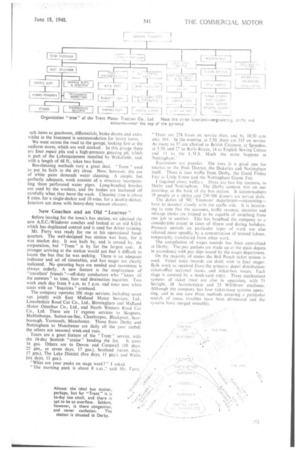.:uch items as gearboxes, differentials, brake drums and axles, whilst
Page 47

If you've noticed an error in this article please click here to report it so we can fix it.
in the basement is accommodation for heavy items, We went across the road to the garage, looking first at the uniform stores, which are well stocked, In this garage there are four repair pits and a high-pressure greasing pit, which is part of the Lubrequipment installed by Wakefields, and, with a length of 68 ft., takes two buses.
Bus-cleaning methods vary a great deal. "Trent" used to put its faith in the dry clean. Now, however, the use of white paint demands water cleaning. A simple, but perfectly adequate, wash consists of a structure incorporating three perforated water pipes. Long-handled brushes are used by the washers, and the bodies are leathered off carefully when they leave the wash. Cleaning time is about 8 mins. for a single-decker and 10 mins. for a double-decker. Interiors are done with heavy-duty vacuum cleaners.
New Coaches and an Old " Learner " Before leaving for the town's bus station, we admired the new A.E.C.-Windover coaches and looked at an old S.O.S. which has duplicated control and is used for driver training.
Mr. Ferry was ready for me at his operational headquarters. The well-designed bus station was busy, for it was market day. It was built by, and is owned by, the corporation, but "Trent" is by far the largest user. A stranger arriving at the station would not find it difficult to locate the bus that he was seeking. There is an adequate indicator and set of timetables, and bus stages are clearly indicated. No queueing bays are needed and movement is always orderly. A new feature is the employment of "travellers' friends "—off-duty conductors who "know all the answers" to time, fare and destination inquiries. Two work each day from 9 a.m. to 5 p.m, and wear neat white coats with an "Inquiries" armband.
The company operates 106 stage services, including seven run jointly with East Midland Motor Services, Ltd., Lincolnshire Road Car Co., Ltd., Birmingham and Midland Motor Omnibus Co., Ltd., and North Western Road Car Co., Ltd. There are 11 express services to Skegness. Mablethorpe, Sutton-on-Sea, Cleethorpes, Blackpool, Scarborough, Yarmouth, Manchester. Those from Derby and Nottingham to Manchester are daily all the year rotrad: the others are seasonal week-end runs.
Tours are a great feature of the "Trent" service, with the 14-day Scottish "cruise" heading the list. It costs 34 gns. Others are to Devon and Cornwall (10 days. 25 gns., or seven days, 17 gns.), Scotland (seven days. 17 gns,), The Lake District (five days, Il gns.). and Wales (six days, 13 gns.), "What are your peaks on stage work?" I asked.
"The morning peak is about 8 a.m.," said Mr. Ferry, "There are 278 buses on service then, and by 10.30 arm. only 164. In the evening, at 5.30, there are 315 on service. As ninny as 37 are allotted to British Celanese, at Spondon. at 5.30, and 27 to Rolls-Royce, 14 to English Sewing Cotton and Ii to the L.M.S. Much the same happens at Nottingham' Excursions are popular. The area is a good one for tourists to the Peak District, the Dukeries and Nottingham itself. There is race traffic from Derby, the Good Friday Fair at Little Eaton and the Nottingham Goose Fait I inquired about welfare, there are two big canteens, in Derby and Nottingham. The Derby canteen was on our doorstep, at the back of the bus station. It accommodates
70 people at a sitting and 250-300 dinners are served daily. The duties of Mr.Yeomans' department—accountinghave to dovetail closely with the traffic side. It is interest ing to note that the accounts, traffic revenue, statistics and
mileage clerks are trained to be capable of switching from one job to another. This has benefited the company to a considerable extent in cases of illness and during holidays. Pressure periods on particular types of work are also relieved more speedily by a concentration of trained labour. temporarily transferred from other work.
The compilation of wages records has been centralized at Derby. The pay packets are made up at the main depots in accordance with pay slips issued by the wages department.
On the majority of routes the Bell Punch ticket system is used, Ticket stock records are dealt with in four stages: Bulk stock as received from the printers: depot distribution: ticket-office sectional issues, and ticket-box issues. Each stage is covered by a stock-card entry. Three mechanized systems of ticket issue are also in operation, with 75 Setright, 18 Automatickei and 25 Willibrew machines, Although the company has four ticket-issue systems opera tine, and in one case three methods covering a particular stretch of route, troubles have been eliminated and the systems have merged smoothly.




















































































